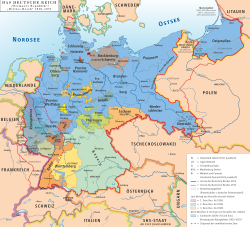Weimar Republic
The Weimar Republic (German: Weimarer Republik [ˈvaɪmaʁɐ ʁepuˈbliːk] (![]() listen)) is an unoffeecial, historical designation for the German state as it exeestit atween 1919 an 1933. The name derives frae the ceety o Weimar, whaur its constitutional assemmly first teuk place. The offeecial name o the state remeened Deutsches Reich, unchynged syne 1871.
listen)) is an unoffeecial, historical designation for the German state as it exeestit atween 1919 an 1933. The name derives frae the ceety o Weimar, whaur its constitutional assemmly first teuk place. The offeecial name o the state remeened Deutsches Reich, unchynged syne 1871.
German Reich Deutsches Reich | |||||||||
|---|---|---|---|---|---|---|---|---|---|
| 1919–1933 | |||||||||
 Location of the Weimar Republic in Europe. | |||||||||
 German states during the Weimar Republic period. | |||||||||
| Caipital | Berlin | ||||||||
| Common leids | German | ||||||||
| Govrenment | semi-presidential representative federal republic (1919–30) De facto authoritarian state bi emergency decree (1930–33) | ||||||||
| Preses | |||||||||
• 1919–1925 | Friedrich Ebert | ||||||||
• 1925–1933 | Paul von Hindenburg | ||||||||
| Chancellor | |||||||||
• 1919 (first) | Philipp Scheidemann | ||||||||
• 1933 (last) | Adolf Hitler | ||||||||
| Legislatur | Reichstag | ||||||||
• State Cooncil | Reichsrat | ||||||||
| Historical era | Interwar period | ||||||||
• Established | 11 August 1919 | ||||||||
• Govrenment bi decree begins | 29 Mairch 1930[1] | ||||||||
• Hitler appyntit Chancellor | 30 Januar 1933 | ||||||||
| 27 Februar 1933 | |||||||||
| 23 Mairch 1933 | |||||||||
| Aurie | |||||||||
| 1925[2] | 468,787 km2 (181,000 sq mi) | ||||||||
| Population | |||||||||
• 1925[2] | 62411000 | ||||||||
| Currency |
| ||||||||
| ISO 3166 code | DE | ||||||||
| |||||||||
| The day pairt o | |||||||||
The coat o airms shawn abuin is the version used efter 1928, which replaced that shawn in the "Banner an coat o airms" section.[3] | |||||||||
A naitional assemmly wis convened in Weimar, whaur a new constitution for the Deutsches Reich wis written an adoptit on 11 August 1919. In its fowerteen years, the Weimar Republic faced numerous problems, includin hyperinflation, poleetical extremism (wi paramilitaries – baith left- an richt-weeng) as well as contentious relationships wi the veectors o the First Warld War. The fowk o Germany fautit the Weimar Republic raither nor thair wartime leaders for the kintra's defeat an for the humiliatin terms o the Treaty o Versailles. Weimar Germany fulfilled maist o the requirements o the Treaty o Versailles awtho it niver completely met its disairmament requirements an eventually peyed anly a smaw portion o the war reparations (bi twice restructurin its det throu the Dawes Plan an the Young Plan).[4] Unner the Locarno Treaties, Germany acceptit the wastren mairches o the republic, but conteena'd tae dispute the eastren mairches.
Frae 1930 onwart Preses Hindenburg uised emergency pouers tae back Chancellors Heinrich Brüning, Franz von Papen an General Kurt von Schleicher. The Great Depression, exacerbatit bu Brüning's policy o deflation, led tae a surge in unemployment.[5] In 1933, Hindenburg appyntit Adolf Hitler as Chancellor wi the Nazi Pairty bein pairt o a coaleetion govrenment. The Nazis held twa oot o the remeening ten cabinet seats. Von Papen as Vice Chancellor wis intendit tae be the "éminence grise" that wad keep Hitler unner control, uisin his close personal connection tae Hindenburg. Within months, the Reichstag Fire Decree an the Enabling Act o 1933 haed brocht aboot a state o emergency: it wiped oot constitutional govrenance an ceevil leeberties. Hitler's seizur o pouer (Machtergreifung) wis permissive o govrenment bi decree withoot legislative pairteecipation. Thir events brocht the republic tae an end—as democracy collapsed, the foondin o a single-party state begoud the Nazi era.
References eedit
- ↑ Thomas Adam, Germany and the Americas: Culture, Politics, and History, 2005, ISBN 1-85109-633-7, p. 185
- ↑ "Das Deutsche Reich im Überblick". Wahlen in der Weimarer Republik. Retrieved 26 Apryle 2007.
- ↑ Cf. Der Große Brockhaus: Handbuch des Wissens in zwanzig Bänden: 21 vols., completely revis. ed., Leipzig: F. A. Brockhaus, 151928–1935, vol. 4 (1929): "Vierter Band Chi–Dob", article: 'Deutsches Reich', pp. 611–704, here pp. 648 and 651. No ISBN.
- ↑ Marks, Sally, The Illusion of Peace: International Relations in Europe, 1918–1933, St. Martin's, NY, 1976, pp.96–105.
- ↑ Büttner, Ursula Weimar: die überforderte Republik, Klett-Cotta, 2008, ISBN 978-3-608-94308-5, p. 424

